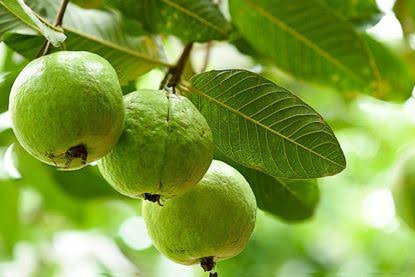PHA Commercial Nursery
Amrood | Guava
Amrood | Guava
Couldn't load pickup availability
Guava Plant Care
Guava plants are hardy, easy to grow, and can produce delicious fruit with proper care. Here's a guide:
---
1. Light
Full Sun: Guava plants thrive in full sunlight, needing at least 6–8 hours daily for optimal growth and fruiting.
Indoor Growth: If growing indoors, place near a south-facing window or use grow lights.
2. Watering
Moderate Watering: Keep the soil consistently moist but not waterlogged.
Frequency: Water 1–2 times a week, more frequently in hot weather. Reduce watering in cooler months.
3. Soil
Well-Draining Soil: Guava prefers sandy loam or a mix of garden soil and compost. It can tolerate a wide range of soil pH (5–7).
Enriched Soil: Add organic matter like compost or manure to improve fertility.
4. Temperature and Humidity
Optimal Temperature: 68–95°F (20–35°C). Guava plants are tropical and do not tolerate frost.
Frost Protection: In colder climates, grow in a container and bring indoors during winter.
5. Fertilization
Nutrient Boost: Apply a balanced fertilizer (10-10-10) every 1–2 months during the growing season. Use organic compost to encourage flowering and fruiting.
6. Pruning
Shape and Size: Prune to maintain shape, remove dead or diseased branches, and encourage air circulation.
Timing: Prune after harvesting to prepare the plant for the next growth cycle.
7. Pollination
Guava is self-pollinating, but cross-pollination by bees can improve fruit yield.
8. Pests and Diseases
Common Pests: Aphids, scale insects, and fruit flies. Treat with neem oil or insecticidal soap.
Diseases: Root rot and anthracnose can occur due to overwatering or poor air circulation.
9. Repotting (if in a container)
Every 2–3 Years: Repot when the plant outgrows its pot. Use a slightly larger pot with fresh soil.
---
Usage of Guava
1. Nutritional Benefits
Rich in Nutrients: High in vitamin C, A, potassium, and dietary fiber.
Low-Calorie: Ideal for weight management.
2. Culinary Uses
Fresh Fruit: Eaten raw or added to fruit salads.
Juices and Smoothies: Makes a refreshing drink.
Desserts: Used in jams, jellies, pies, and cakes.
Savory Dishes: Some cuisines use guava in chutneys or paired with spices.
3. Medicinal Uses
Digestive Health: High fiber content helps with constipation and promotes gut health.
Immune Boost: The high vitamin C content strengthens immunity.
Blood Sugar Control: May help regulate blood sugar levels in diabetics.
Heart Health: Potassium and antioxidants support heart function and reduce blood pressure.
4. Skin and Hair Care
Skincare: Guava leaf extract is used in natural remedies for acne and skin blemishes.
Haircare: Guava leaves boiled in water can be used as a rinse to strengthen hair.
5. Leaves and Bark
Tea: Guava leaves can be brewed into tea to aid digestion and reduce diarrhea.
Wound Healing: Crushed leaves are applied to minor cuts and wounds for their antiseptic properties.
Guava plants are versatile, rewarding, and can provide health benefits along with their tasty fruit.
Share


